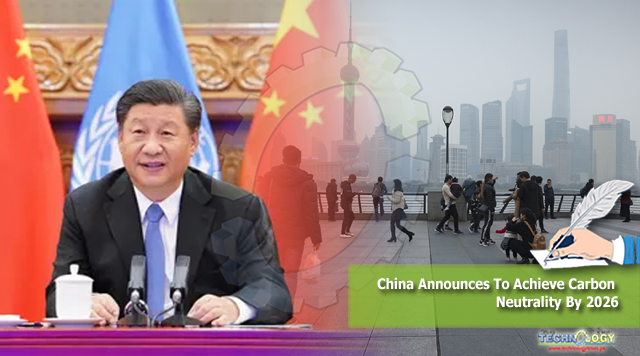But back to China. Last week China surprised the world by suddenly announcing to the United Nations General Assembly that it would aim to peak emissions before 2030 and to achieve carbon neutrality before 2060.

China Announces To Achieve Carbon Neutrality By 2026 : The environment has become an important global priority, attracting vast sums of research and conference dollars. There is no doubt that at our stewardship of the Earth for future generations, and our own well-being, is important.
However, laws adopted to protect the environment can impose significant economic costs which, at bottom, affect those on the poverty line. Money spent on environmental research and conferences, though hopefully practical and productive, also has opportunity costs; that money could be spent on actually implementing practical initiatives which directly help people on the ground.
The clash becomes even more pertinent in the economic wake of Covid 19 lockdowns. The World Bank states: “Under the baseline scenario we estimate that COVID-19 will push 71 million into extreme poverty , measured at the international poverty line of $1.90 per day.”
China accounts for 28% of the world’s emissions. Hence any environmental initiatives, such as the 2016 Paris Agreement, which China isn’t on board with are unlikely to be truly effective. Climate Action Tracker rates China’s environmental approach thus far as “highly insufficient”.
As an aside, the United States is the next highest with 14.5%. However, despite pulling out of the Paris Agreement, it has made good progress on reducing its emissions. Since 2005, national greenhouse gas emissions have fallen by 10%, and power sector emissions have fallen by 27% — even as the economy grew by 25%.
And that is really the question for many countries: how do you both grow your economy (which brings more people out of poverty) and protect the environment?
While there is no doubt poverty remains one of the most significant problems facing the world today, global poverty rates have been cut by more than half since 2000. As Max Roser and Esteban Ortiz-Ospina state in a report:
“with the onset of industrialization and rising productivity, the share of people living in extreme poverty started to decrease. Accordingly, the share of people in extreme poverty has decreased continuously over the course of the last two centuries. This is surely one of the most remarkable achievements of humankind.”
It seems very unfair to tell developing countries that they are not allowed to grow rich like the West. Yet, prosperity is a primary driver of CO2 emissions (though clearly policy and technological choices make a difference).
For instance, in many of the poorest countries in Sub-Saharan Africa, such as Chad, Niger and the Central African Republic, the average footprint is very low. In just 2.3 days the average American or Australian emits as much as the average Malian or Nigerien in a year.
But back to China. Last week China surprised the world by suddenly announcing to the United Nations General Assembly that it would aim to peak emissions before 2030 and to achieve carbon neutrality before 2060.
However, as one commentator agrees, for the Chinese Communist Party, staying in power is its highest priority. Therefore, I’m not holding my breath.
Tilak Doshi writes insightfully in Forbes:
“At the Durban climate conference in 2011, China’s lead negotiator Xie Zhenhua put the point across even more forthrightly, asking Western governments “what qualifies you to lecture us on what to do”? The Chinese government, like its counterparts in India and other developing countries, knows that forsaking national economic growth for a supposed global good is not a sustainable political strategy.
While China talks a good game on climate change, it will most assuredly try to become rich before it gets old.“
It is true that China may well get old before it gets rich – meaning its future economic outlook may not be great. Much of this is due to the one-child policy. No doubt the Chinese Communist Party will indeed make holding on to power its priority.
It is also true that over the past several decades, China’s economic development has lifted hundreds of millions of Chinese out of poverty and resulted in a burgeoning middle class. In 2002, China’s middle class was only four percent of its population.
A decade later, this number had climbed to 31 percent, constituting over 420 million people. However, this has come with an economic cost; its emissions have nearly tripled between 2000 and 2019. Will it really be willing to sacrifice economic growth for the environment?
So, how do we both ensure that we allow everyone to live with dignity through maintaining a healthy economy, as well as remain good stewards of our environment and maintain a healthy environment for our own well-being? It is certainly a question to be grappled with.
Originally published at Mercatornet